OMD
-
Interview
published: 6 /
10 /
2010
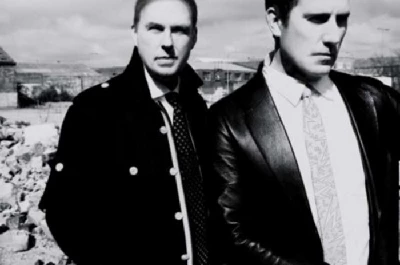
Marc Samuels speaks to Andy McCluskey, the front man with 80s synth pop pioneers OMD about his group's recently released first album in 24 years, 'History of Modern'
Article
The album, ‘History Of Modern’, released in September, saw the original line up of OMD - 80s synth pop pioneers responsible for hits such as ‘Enola Gay’ and ‘Souvenir’ - reunited for their first album together in 24 years.
With the album a return to their electronic roots, and a UK tour starting tour next month, Marc Samuels catches up with singer Andy McCluskey to discuss everything from Lady Gaga, Kraftwerk and Simon Cowell to what it's like to make a modernist album in the post-modern era.
MS: So, you’re back with a new album. It must have been nice to do something without the weight of record company expectation….
AM: Which was exactly how we did our first album. When we were at our best. And I think this is one of the best albums we've ever done, precisely because we just did what we felt like doing. Which is the way we've always done our best stuff. And (on this album) we felt like we were teenagers again. We just made a record because we wanted to have a conversation with ourselves in the language of Orchestral Manoeuvres in the Dark. But whenever we were conscious about having hits or selling records, we didn't do a very good job usually!
MS: Ironically your mid 80s material was more commercial yet less successful when compared with the arguably weirder stuff of 80-81.
AM: Yeah, ‘Architecture and Morality’ sold well over three million and it was quite a schizophrenic album. We had three big hit singles. But the rest of the album was really quite strange. Our record company used to say to us "Are you Stockhausen or Abba?" And we were like "We're both!"
MS: Does it surprise you how popular synth pop has become in the last ten years? With Lady Gaga taking over the world, Little Boots, LCD Soundsystem, Hot Chip etc, it’s become quite a renaissance.
AM: You can imagine how depressing it was at the height of Britpop to be perceived as an 80s synth band and past your sell By date. Especially because we were the last of the modernists. Our generation i.e. Depeche Mode, Pet Shop Boys, Human League, Cabaret Voltaire were trying to be the future.
And so fifteen years later to be told "You're no longer the future. You're the past. The future is actually the 60s and 70s!" was a bit of a hard pill to swallow. So yeah it's amazing, but it's allowed us to play again and to make a record again. And kids who are my children's age are tipping their hats to us and saying how cool and influential we were. And I'll happily take that!
MS: It must be gratifying when you see these new electronic acts to know you played your part as a pioneer and can effectively say "I'm responsible for that".
AM: We wouldn't say it but other people are saying it for us and it's great. Especially when you think it seemed like we were on some bloody crusade in the early days, fighting against the very reactionary music journalists for whom electro music was neither rock and roll enough, manly enough, sweaty enough, genuine enough, guitarry enough….we were swimming upstream…and then, the guitar bands had their revenge in the 90s, and all of a sudden the whole thing's flipped over and at the age of 51 it appears that I've got more bloody respect and credibility than I had at 21. I'm not going to complain about it. It's been a long bloody fight though! (Laughs)
MS: Is there a danger that fashion will turn again? Is everyone going to be fed up of electro-pop soon?
AM: I think the only saving grace is that I believe we're in a post modern era of music. Pop music is old. Whether you consider it started with jazz, swing or rock and roll in the 50s, it's old. There is nowhere new go to. Seriously. There are new bands who have their own voice and style but in terms of the type of music they're making....it's just recombinations of other historical styles. There is nowhere new to go. There just isn't, I'm sorry to say, and it's not because I'm old. We were lucky that there were still new places to go to be the future when we started. So I think.....if there's no new fashion, then nothing is out of fashion. And it just boils down to "Do you do your genre in a good and credible way?" But if you do, then carry on.
MS: In the era of Myspace and Spotify when it's easier to get your music exposed, are there noticeable similarities to when you started on Factory with your first single 'Electricity' and that whole (post) punk spirit/ethos?
AM: Yeah, in some ways that kind of spirit of independence…just doing it and not caring how many you sell is absolutely the early spirit we had, the Factory spirit. It was just about believing in what you did and doing it because you believed in it, not because you wanted to have a big mansion or sell millions of records or shag loads of women. In that respect the internet is great because it allows you to spread the word.
MS: What does ‘History Of Modern’ as a title mean to you?
AM: As a title of an album it seems entirely appropriate. What are a bunch of late 70s modernists/futurists doing making another record? What does a modernist do in the post-modern era? We believed that we still had something that was worth saying, in a sound that was worth saying it in - that was current and very fashionable as we've discussed - but the most important thing was that we felt we had something worth saying both lyrically and musically. And in songs that were good songs. That weren't crap. Once we decided that we could do that and not just make a record that was rubbish and embarrassing, then we got into a long conversation with ourselves about what to call the record.
And ‘History Of Modern’ seems to be so appropriate. Are we making a retro-futurist album. Is it the history of ourselves? Just for a million reasons that’s the right title. And we've even ended up with two songs of that title on it as well!
MS: It’s a post-modern album in many ways. From sampling Komputer (aka the Bootleg Kraftwerk) on ‘The Right Side’ to the nods to your own history….
AM: There are a lot of references to our history, both in our homage to Kraftwerk and a few of our own little songs. I mean the melody of ‘Sister Marie Says’ is from 1981 but, we have tried to do it in a style, production wise, that is modern, so it just seemed totally appropriate but then it's a dangerous thing to do, because when most people our age come back and tour, most people want hear the old songs. They don’t want to hear the new songs, because they're generally going to be crap. But we had time to come up with what we think is a collection of very strong pieces of music. We're conceited enough to think that we've done it well, but in the end it's what other people say about it. Because no artist goes and promotes a record by going "Actually it's shit, please don't buy it."
MS: You referred to ‘RFWK’, your Kraftwerk tribute….was this a case of reassessing what inspired you in the first place? Although, of course, ‘Electricity’ was arguably a homage in its own right too…
AM: When we decided to make an album and call it ‘History Of Modern’ it seemed entirely appropriate that we would finally say thank you to Kraftwerk. Which it says: “I loved you when I found you/I loved you like a son.” They were hugely influential. But ‘Electricity’ was a homage in its own way. I can remember in the early 90s getting to know Karl Bartos and going to Düsseldorf and having dinner at Wolfgang (Flür)'s apartment with Wolfgang, Karl and Emil (Schult). Wolfgang had a gold disc on the wall for the ‘Radioactivity’ single and I said "Oh, ‘Radioactivity’ was our Kraftwerk song…‘Electricity’ was really just a punky version of ‘Radioactivity’." And they all went "Yes, we know"! (Laughs)
MS: Kraftwerk of course have seen a bit of a revival too – album reissues and with the technology now, they’re touring more than in their 70s heyday. Like you, it must be nice to play live and not to have to lug all the old synths around.
AM: Kraftwerk will still be touring when Ralf Hütter is dead! He will finally get to send the robots out. I mean he might as well be now. Because when they go on stage I'm not sure what any of them are actually doing….Although it's funny to say this but it was actually the fragile humanity of Kraftwerk that made them so beautiful.
In the same way that with OMD, technology and humanity and the tension between the two was what we were about...everybody said that Kraftwerk were cold, but they weren’t. There was a very melancholy beautiful romance to them and the nearer that Ralf has got to his stated aims, the less humanity there is, and frankly the less interesting it is. I mean ‘Vitamin’ and ‘Aero Dynamik’, I'm sorry, they are empty, hollow bits of programming. Whereas ‘Neon Lights’, ‘Europe Endless’ – soaring, beautiful and human.
MS: They invented electro pop but they can't invent it again so where can they go?
AM: This is it. I think Ralf is still on a journey to distill and refine but in the end when you distill water until it’s just distilled water it tastes of nothing. It’s the little imperfections and impurities that give things their taste!
MS: Back to the album….on ‘New Babies, New Toys’, you're quite scathing about manufactured pop, or at least reality pop.
AM: I'm not scathing about manufactured pop. Because some of it is brilliant. But the whole 'Pop Idol'/'X Factor' thing is not about music, it's about money. It's about Simon Cowell making loads of money by manipulating the gullible British public who buy into a three month rollercoaster of emotions with the tears and the joy of whoever is going to win this year, who is just mince in the machine. And next year they're out with the garbage, and it's onto the next one.
It's not just that... Simon Cowell in his BMG days was single handedly responsible for some of the most shockingly terrible music that's ever been inflicted. Effectively once the marketing men took over music - because that's what he is - he's not an A&R man, he hasn't got ears, he's a marketeer - once the marketing and promotion men took over the decision making, once the accountants were calling the shots in the record companies, the quality of the music went out the window because they weren't interested in music. They weren't looking for something new. It was "what sells this week? Let's repeat that formula".
So it's no accident that of all the people who have come out of these reality music shows, there's only been two or three who have had any kind of career - Leona Lewis because bleeding whatever it was (I think he means ‘Hallelujah’-MS) was a fucking great tune and Will Young, because Simon Cowell wanted nothing to do with him, so Will Young kind of got his own shot at it. And Girls Aloud, because they're well managed and well A&Rd. It's why I hate boy bands...it's not about the music, it's about selling records - records, not songs - to gullible women who have got the poster on the wall, who fancy the artist, and for whom love is deaf! That's why, when I did Atomic Kitten I worked with a girl band, not a boy band.
MS: The title track keeps up the OMD tradition of songs with off kilter subject matter.
AM: I think when we started out it was important to us that if you’re going to sing a song about something, to do something that was worth singing about. Something that we were interested in, that we hoped other people would be interested in. There's nothing wrong with love songs or sad songs - we've got plenty of personal feeling songs on our records over the years - but we see absolutely no reason not to write songs perhaps wearing our intelligence on our sleeves. I think it’s entirely reasonable to write songs about planes that drop atom bombs or oil refineries and things like that because it interests me! So I want to write a song about it!
MS: It helps define you, OMD, they're that band that...
AM: ...we're the band who write love songs about pieces of inanimate machinery!
MS: Do you have a favourite song on the album?
AM: I shall resist the temptation to say "they're all my babies of equal importance”. But probably simply by the fact that it's the last thing we did, ‘New Holy Ground’.
Paul and I had finished the album and were doing some bonus tracks - they used to be B-sides, but now they're bonus tracks - and we've always had fun doing that because the gloves are off. We've done the album. We've done the single. We really don't care. We can do what the fuck we want with a bonus track. And we were excited about it: we wrote it so quickly, the whole thing was written and recorded in about two hours and we actually phoned up the record company and said "Hang on a minute. We've got a new song. We're putting this song on the album!" So just by the fact that it's so brand new, so fresh, it's probably my favourite right now. Ask me another time and it'll probably be a different song!
MS: You've said in the past that, in your early days you were quite painful and pretentious. Do you think if you went back and talked to your younger self - assuming they would have listened - your career or music would have been any different?
AM: No, the 21 year old Andy would quite frankly be horrified that the 51 year old Andy McCluskey is still in the business. I've said it before but it bears repeating. Young Andy would have thought that old Andy was complete anathema, you know like a kamikaze pilot with a long service medal! It's not supposed to happen!. So whilst old Andy would like to go back and say "Listen, this is the first time. You can't do the first time again. This is as exciting as it gets. Love every minute of it. Because when you’re older you'll wish you could have enjoyed it more.” I wouldn't have listened.
And who would? The painful, precious, pretentious fucking pain in the arse that I was - and still am - wouldn’t have had anything to do with me now. It's just the band wouldn't have been the same if I hadn't been that way. In the same way that the band wouldn't have been the same if Paul hadn't been the way he was. And we always used to joke that two Pauls would have got nothing done, but two Andys would have ended up strangling each other after a week!
MS: It’s like the various stages of self awareness in life.
AN: Yeah, basically, whatever stage you're at, you like to think you know it. And then time passes on. But what I will say is that there have been times when we've done the right thing for the right reasons. And then there were times when we did the wrong thing for what we thought were the right reasons but which weren’t. It's the same in everybody's life, there's ups and downs. I think we're in a good place now. Because it sounds crazy but I do think that whilst I'm not as pretentious as I used to be, and hopefully not as painful, I've leant to roll with the punches.
I think we made this album for many of the reasons we made our first album. And it's a good thing. I think that's why it's a good album. If we really wanted to make an album to strike whilst the iron was hot, we would have put something out at the end of 2007, after we’d come back from playing 40 gigs and everybody was talking about us. And even people on our website were saying "Oh, you've had your chance, the electro thing isn't going to last forever”, but we couldn't release a record because we didn't have anything to release. And we know from our own painful history that rushing something out because it's the right time to do it or you need to get something out is not the right reasons. You should present something when you think it's presentable.
MS: Is there a danger that if ‘History of Modern’ is successful, you'll be under pressure to follow it up and that you'll end up in the whole album/tour/album/tour cycle?
AM: Well, we’re not multi millionaires but we've got money. We're fortunate that we wrote some songs that still get played on the radio and we earn money from them. We don't need this album to make money. In fact right now it's cost us a bloody fortune because we hadn't got a record company to give us an advance. We think we'll get our money back. We're doing it just because we wanted to do it. Not because we need to pay the mortgage. As long as we keep reminding ourselves that we should only make records when we have something to say and we're saying it in a listenable and quality way then that’s cool.
I've already said to myself, and I hope Paul agrees, that we'll go through this, we'll do the promotion and touring – and we hope to go to America and to play festivals in the summer - and then we'll just stop. We'll get off the conveyor belt and have a think. Because if you stay on the conveyor belt you might find yourself going in a direction you didn't want to go in.
MS: Do you feel you've got something to prove? Perhaps OMD haven't garnered quite as much recognition as some of your peers from the early 80s?
AM: Well, you've touched on somewhat of a raw nerve. You're absolutely correct. One of the things that Paul and I said to each other when we decided to play again, was that, by the very nature of the band, because we weren't trying to be pop stars and weren't terribly interested in presenting ourselves as sexy or colourful, when people think back to 30 years ago, we're often forgotten. Because we were just about the music. A
And especially when people talk of 'the 80s revival', they remember Spandau, Wham!, Culture Club and Duran Duran because they were the most visible. It's like going to the zoo> You remember the elephants and the lions and the tigers because they're the most visible. You forget the gazelles and the tortoises even though they're a lot more of them and they're actually more important! So, yeah, there was an element of that. We were fed up of being the forgotten band!
But the dangerous thing is, once you get into the nice position which we've got into, where people have remembered us, and ‘Architecture & Morality’ is considered to be an “iconographic work of genius”, that ‘Dazzle Ships’ is our “fractured masterpiece”….it's a really stupid fucking thing to do to make a new record and stick your neck on the chopping block again. Because the likelihood is that you've lost the plot and that you've made a crap record! And then all the good work you've spent the last three or four years doing has completely unravelled. So either we've made a catastrophic mistake or we've made a good album.
MS: I suppose no matter how well the new album is received critically and commercially, when you play live people will shout for ‘Enola Gay’.
AM: And they'll get it. The reality of playing live is that, we're walking on a tightrope: on the one hand 10-20% of the people who know lots of our records, would like to hear the new album, the weird stuff and b-sides. But the other 80% have got the 'Best Of', and you've got an obligation to those people as well. You're charging them £30. You've got to give them what they want, so we try and strike this balance. When we tour we will probably play five or six new songs. There will be at least one really weird old song off the first album that we haven't played for 28 years, and then there'll be 15 hit singles. Because we've got them and we can play them!
MS: Thinking back to ‘Electricity’ and Factory, with their ‘pop as art’ ethos, do you think there is room for anyone like the late Tony Wilson these days and that spirit?
AM: I'm sure that Lady Gaga sees her music as art. You could claim that it was performance art. It's very multi media, especially on stage, very visual. I'm sure Coldplay consider their albums to be their art. But for the most part record companies don't exist to spread beautiful art around the world. They exist to make money. And the less money there is to be made, the more problems they've got.
The music industry is in a seriously bad place. I think that music as part of a multi media future has a place. I'm sure that what you listened to when you were young was a large part of how you defined yourself. It's not really the case any more.
My son, if I look at his Ipod, he’s got Nirvana, 50 Cent, Kanye West, the Monkees, the Beatles, Pet Shop Boys...there’s no style niche, there's nothing that says “I am about this and not that”. It's just, "I like that". He's just cherry picking from genres....we are in this post modern age. There is no set fashion any more. You can not look at somebody for their clothes and their hair cut and say "I know what they're into". Because if you look at their Ipod, you'll be wrong.
MS: Funnily enough, from a fashion point of view, the men's high street clothing looks of the last few years - skinny ties, epaulets etc - is very OMD circa 1983.
AM: I suppose it's chimed in with the resurgence of electro and the early 80s. I nearly fell off my chair when I saw Franz Ferdinand a few years ago. I was like "Am I looking at our ‘Dazzle Ships’ photographs? Bloody hell!"
MS: The track ‘Save Me’ (a bonus track on the album which mixes Aretha Franklin and OMD's ‘Messages’) has polarised people, hasn't it?
AM: When mash ups came into fashion a few years back, I rather liked them. And I thought in many ways it was quite a sort of natural modern reflection on the stage of the music industry that there was nowhere new to go. It was just recombinations. And I thought it would be quite interesting to do a mash up album of OMD and other people. And in fact that's what I was doing.
There was a plan for there to be a mash up album of our own songs with other people's - there's a few that are out there – ‘Dazzle Ships At The River’, ‘At The River’ cut up with loads of ‘Dazzle Ships’ samples, ‘Talking Loud And Grace’, which was ‘Talking Loud And Clear’ with Grace Jones. But it became obvious that it wouldn't work because both of the record companies would want 100% so there was no margin for making any money from it. And, secondly, the mash up thing went out of fashion.
So ‘Save Me’ was the last remnants of that mad idea and it was my favourite. It's interesting how a vocal from 1967 from the Queen of Soul and music from 1980 when cut together with some new programming suddenly really sounds like 2010. But you're right, it’s polarised people, even in the band - Paul and Martin hate it. They don't think it says anything about us. Maybe it doesn't. It's got Aretha Franklin on lead vocals! But it's a bloody great piece of music.
The Americans have chosen it as their first single! It's not even on the album in the UK, it's a bonus track on I-Tunes! Maybe that's typically OMD.
MS: When it comes to electro-pop's young pretenders, Little Boots has worked with Phil Oakey, whilst La Roux have collaborated with Heaven 17. Who would OMD like to work with?
AM: I'd like to write a song for Lady Gaga. I'm not a fan of everything she does. Don't play me ‘Alejandro’ ever again, but I thought ‘Poker Face’ and ‘Bad Romance’ were two of the best songs of the last couple of years, real quality electro, in your face, wonderful tunes.
We keep going on about electro's back. Unfortunately a lot of it is people who want to be in the news again, who are copying the current fashion and they've got actually got nothing to say for themselves. But it was ever the case. Every genre has a few leaders who have something to say. And there's all the rest who jump on the bandwagon. We like Villa Nah, because they have their own style and their own thing to say. We really like the Mirrors, who are supporting us in Europe. They have their own way of doing things. Robyn…I'm really looking forward to ‘Body Talk Part 2’ because I thought the first one was just fabulous. She's got her own way of doing things that's terribly contemporary, very electronic and wonderful.
MS: It's commercial but edgy at the same time.
AM: The single version of ‘Dancing On My Own’ is fairly hard but commercial, but the album version is a slab of industrial synth music. It's relentless. But she's got a melody over the top of it. It still works. I've got loads of time for Robyn. I went up to her at a charity gig we both played and said "I love your music and thought you were great tonight" and she went “Thanks” and you could see her thinking "Who the fucking hell is that?!”
MS: Is Gaga our vindication that the geeks and outsiders have won and taken over the mainstream?
AM: She's done a brilliant job. And she’s made herself look great in terms of the great costumes and cartoonishness. I seriously doubt she'll have a career as long as Madonna's. But when she gets it right, it's wonderful. When she gets it wrong, it’s painful.
As for Little Boots, I was really excited about the album until I got it. I though the production was overly slick. There's some very good songs on it. All the early You Tube rough demos indicated it was gonna be very kind of minimal, simple and edgy and then it got all polished up. Be interesting to see what her next album is like. See, I remember when she was in Dead Disco and came to my studio. They were great.
La Roux, unfortunately, I just have this suspicion of her, and I could be wrong, that she's really just a performance art school wannabe who was savvy enough to get her monstrous quiff hair cut and get somebody to program a record for her that sounded like early Depeche Mode. She had a couple of catchy tunes. But to me it doesn't have anything to say. It's bandwagon jumping. That's my feeling, I might be wrong and doing her a disservice but it doesn't excite me in the same way that Robyn does. Robyn does just some very cool individual stuff.
MS: Thank you.
Band Links:-
https://en-gb.facebook.com/omdofficial
http://www.omd.uk.com/
https://twitter.com/officialomd
https://www.youtube.com/user/OMDenglis
https://plus.google.com/10638569313334
Picture Gallery:-
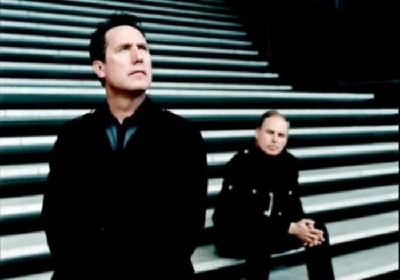
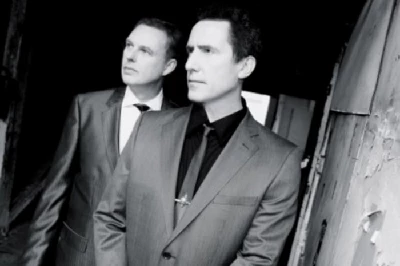
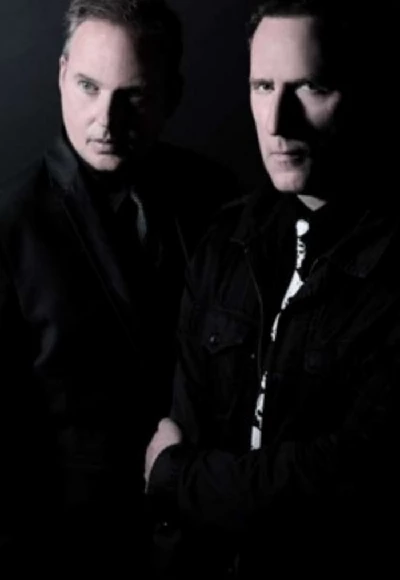
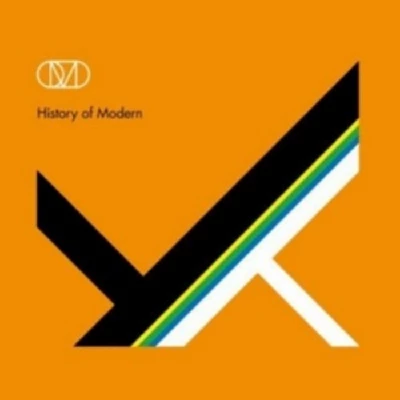
Visitor Comments:-
|
|
358 Posted By: Paul Waller, work, margate on 20 Oct 2010 |
i loved reading this and especially enjoyed the Simon Cowell rant. good job
|